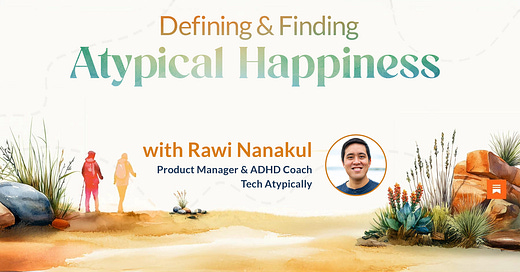
#63🔥 How to cultivate the courage to pursue a promotion when you have ADHD
Taking control of your promotion by learning the language required to make the leap.
Welcome to Tech Atypically 👋, your weekly blog for navigating the challenges of ADHD and being in the tech industry.
I am a coach specializing in ADHD and product management. I help you change one belief and take one action each week.
Part 6 of the Performance and Productivity series.
🐼Tackle your challenges of working in tech and having ADHD with me
🦋 The Takeaways
The Belief: Despite encouragement, I believe I'm unready for promotion.
The Reality: Promotions gauge abilities - not self-worth.
The Action: Use a framework to understand promotion procedures.
⭐️ Introduction
Last week Michael talked about ambiguity in work projects. This week I follow up with another common ambiguous work challenge, promotions.
I’ve struggled with titles throughout my career in tech. I’ve either felt overqualified or underqualified for the titles I’ve held. Am I a senior PM? Staff? CPO?
Who I am in life is hard enough for me to figure out. How am I supposed to live up to externally bestowed titles?
Today’s issue isn’t about the direct strategies to get promoted. For those strategies, I recommend you check out the Magic Loop by
or PM role guidelines byInstead, I discuss the challenges of negative self-esteem related to ADHD that can hold you back from pursuing promotion and a framework for you to use for your next promotion process.
😵💫 The Belief - I’m not worthy
My ADHD tendency towards low self-esteem and self-worth means I shy away from pursuing and believing I should be promoted. Despite my manager’s encouragement, I’ll tell myself I’m not ready.
I’m not alone in my belief.
Having ADHD is often associated with having lower rates of self-worth. It’s often due to the constant criticism that people with ADHD endure due to mistakes from the disorder.
Combine it with emotional dysregulation and rejection sensitivity dysphoria and you have a recipe for someone who often thinks they’re never worth their title and experience the pain of rejection far higher than their peers.
Thoughts like, "I'll just screw it up", "Other managers would never approve me", or "I’ll never be as good as my new peers" can stop you from ever even trying for a promotion.
So what do you do?
If you’re me, you suffer in silence and while taking no action.
🤝 The Reality - Promotions gauge abilities - not self-worth
Promotions can be scary but can help you recognize who you’ve grown to become. They are a measure of your experiences and abilities, not a judgment of self-worth.
This is an important differentiator because as someone with ADHD, it can often feel like promotions are another “life test” for you to fail.
It’s not your fault, however. If I had to guess, I would assume that most promotion processes are often not built with people with neurodiversity in mind.
Acknowledging the system is often not built for you is the first step in accepting how to move forward in it. The system might not be friendly to you but it doesn’t mean you can’t succeed in it.
You might not be able to change how the promotion process happens at your company. However, you can choose to learn how it works and use your beautiful ADHD mind to hack it to your advantage.
Hyperfocus that shit and make it your own.
Similar to the old saying “Don't hate the player hate the game.”
Don’t hate the game, learn it so well that you play it in your way.

🛠️ The Action - MTIE Framework
Here’s a way to create your own approach to your next promotion cycle. It’s designed for you to organize the key points I think managers and companies often use for promotions.
I choose to believe that good companies and managers want to promote their employees. However, they need some help to fill out the checkboxes to make it happen.
Use the Measure, Tell, Identify, and Execute or MTIE framework to help you approach your next promotion.
Measure - Do role guidelines exist at the company?
If so, where do I stand today and where do I need to grow to get to the next level? What are the domains of a next-level PM and where am I now?
If role guidelines don’t exist, create one or use Ravi’s role guidelines. You might have to change the titles slightly to calibrate your company’s titles.
Tell the story - How and to whom do I need to tell my promotion story?
Do you write a narrative document? Powerpoint? Bullet list? Every place is different.
What metrics or KPIs do your manager and their manager care about when they review a promotion request?
What are the other stakeholders involved in a promotion that you should be aware of besides your manager and skip? A tech assessor? A partner org leader?
Doing this earlier in the process reduces the chance that you’ll miss a stakeholder or requirement when your promo request is reviewed.
Identify - Are there opportunities currently available that would allow me to demonstrate my ability at the next level?
Sometimes this answer is a no. If that’s the case, I encourage you to work with your manager to create or find one.
The higher you go up the ladder, the more you’ll be expected to find the “next level” projects on your own.
Execute - Do the tasks or projects needed.
Deliver on the projects needed for your promotion.
Update your narrative from the checklist you’ve created from the previous sections.
Deliver the narrative when everything is done.
If your promotion gets rejected, you can use the content for your resume for your next job.
✨ Conclusion
Promotions are ultimately external measures created by imperfect humans in imperfect company systems.
I say this to remind you that titles are imperfect reflections of work abilities, not your self-worth. One company’s staff-level PM is another person’s standard PM. The calibrations or titles are only relevant to those companies.
They shouldn’t be used as a way to calibrate your self-value. I’m not saying it’s a bad thing to chase titles. Overcoming the challenge of getting promoted is a great feeling that should celebrated.
It shouldn’t be the only one you chase. It’s more important to chase the “title” you find the most fulfilling. The ones that matter most when you die: dad, friend, wife, partner, husband, etc.
The ones that you don’t have to to present a narrative doc for.
🐼Want to talk to me privately about your ADHD struggles?
⏭️Next Week
Guest author Dr Megan Shen writes “Coping with Loss at Work: Navigating Grief with ADHD for Improved Mental Health and Job Performance”













Extremely insightful content, keep it coming